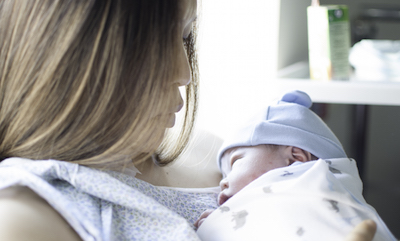Medicaid-Covered Mothers Have Less Say in Birthing Experience.
 Giving birth in the United States is a radically different experience based on race and income, illustrated most brutally by the Black and Indigenous maternal mortality crisis.
Giving birth in the United States is a radically different experience based on race and income, illustrated most brutally by the Black and Indigenous maternal mortality crisis.
Now, a new School of Public Health study finds that insurance type itself also plays a role in how mothers are treated, and how much agency they have in maternity decisions.
Published in the journal PLOS One, the first-of-its-kind study is part of Listening to Mothers in California, which examined women’s experiences giving birth in California hospitals in 2016.
The study finds that, after adjusting for demographics and health conditions, a mother on Medicaid is three times less likely than a mother on private insurance to feel she had a choice about whether she had a vaginal or cesarean birth, or an episiotomy. Compared to private coverage, coverage by Medi-Cal (California’s Medicaid program) was also associated with being about half as likely to have a choice of prenatal provider or to be encouraged by maternity care staff to make one’s own decisions about labor and birth.
“This study is the largest to date using women’s voices to examine their maternity experiences in births funded by Medicaid,” says study lead author Eugene Declercq, professor of community health sciences at BUSPH and a member of the Listening to Mothers team.
“It documents the limitations on their ability to share in decisions about their own care, and is a call for clinicians and policymakers to make changes that ensure equitable rights for all mothers, regardless of insurance status,” he says.
“Every indictor of disrespect and limit on choice that we examined was worse for women with Medi-Cal versus private insurance,” says Carol Sakala, director of maternal health at the National Partnership for Women & Families and the survey’s principal investigator. “This suggests women with Medi-Cal systemically receive substandard quality of care. Our results sound alarm bells about missed opportunities for mitigating the maternal health crisis within the Medi-Cal program.
For their analysis, the researchers used survey data from 1,087 women with commercial private insurance and 1,231 women enrolled in Medi-Cal. The sample was demographically representative of all live births in California that year.
The researchers then analyzed the relationships between the different insurance types and the women’s experiences around maternal agency, including decision-making about interventions such as vaginal birth after cesarean and episiotomy, feeling pressured to have interventions, and their sense of fair treatment. The researchers then adjusted for the women’s demographics, including income, as well as attitudes toward birth, type of prenatal care provider, type of birth attendant, and pregnancy complications, to identify how much of the difference in experiences was associated with insurance type.
Of course, the authors note, demographics and conditions are rarely equal for mothers on private and public insurance: In this sample, over half of non-Latina Black women and over two-thirds of Latina women were on Medi-Cal, compared to just over a quarter of non-Latina white women and just under a quarter of non-Latina Asian and Pacific Islander women; the majority of women born outside of the U.S. were on Medi-Cal; and 85 percent of women who spoke Spanish at home were on Medi-Cal. Before accounting for these and other demographic differences, many of the gaps between privately- and publicly-insured mothers’ experiences were twice as large.
However, the researchers also found that insurance type may also influence other forms of discrimination: After adjusting for demographics and other factors, women with Medi-Cal were twice as likely to report that they were treated unfairly because of their race/ethnicity (particularly Asian and Pacific Islander women), and four times as likely because of the language they spoke.
With Medicaid covering 42 percent of childbearing women in the United States, the authors write, the program has huge potential to improve maternal health, and better treatment for Medicaid enrollees would have a profound effect on overall equity in maternal health.
“It is critical that maternity care providers—and really any gatekeepers to care—are made aware of these inequities,” says study co-author Candice Belanoff, clinical associate professor of community health sciences, “and that they take steps to ensure equitable treatment and access regardless of insurer.”